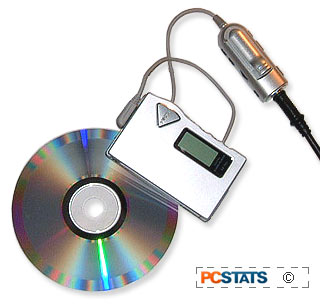There are several alternative
formats available for compressing and encoding CD audio. Microsoft has its own format, WMA
(Windows Media Audio), which is probably the second most popular (and supported)
format for encoding music.
'Ogg Vorbis' is an open source
format that originated in Linux, Apple uses the AAC format for its Itunes
service, etc., etc. Most of these formats can claim increase quality
at lower bit-rate settings as compared to MP3 files, but none of them (though
WMA is getting close) offer the range of supporting software and hardware
players that MP3 does.
 A vastly increasing range of electronics are available to
playback MP3 files on your computer system or outside it. In terms of software,
the media player built into Windows XP (as well as Windows 2000 and
9x/ME provided you have upgraded it from the Microsoft website) has the ability to play
MP3 files, and comes with a variety of features designed
to make the experience more enjoyable, including visualizations to add
visuals to your music.
A vastly increasing range of electronics are available to
playback MP3 files on your computer system or outside it. In terms of software,
the media player built into Windows XP (as well as Windows 2000 and
9x/ME provided you have upgraded it from the Microsoft website) has the ability to play
MP3 files, and comes with a variety of features designed
to make the experience more enjoyable, including visualizations to add
visuals to your music.
Several
excellent free third-party applications are around, such as the popular Winamp
by Nullsoft.
As for playing MP3 files
outside your computer system, there are a variety of choices. While MP3
support in quality home stereo equipment is rare, virtually all home DVD players support
MP3 playback, and can be easily hooked into your stereo system as
you would for movies.
For portable music, all the major manufacturers including Panasonic
and Sony now make portable CD players which support MP3 playback. As a typical
700MB recordable CD can easily hold over one hundred MP3 files, this
is an excellent option. For an even more
portable option, the small size of MP3 files allows an equally small size of player
using flash memory as the storage device and connecting directly to your
computer to add music.
Be aware that just because a given audio device advertises MP3
compatibility does not necessarily mean that it will work perfectly with all
of your music. Many older MP3 players may not work at all
or work well with higher levels of encoding or variable bit-rates, so it's worth looking into
this further before you decide what to buy.
Also,
many devices which are primarily intended for another purpose, such as DVD
players, may only work if you place all the MP3 files directly onto the CD, and
not organize them into separate directories of folders.
CD
copy protection and Legal issues
(For a more
comprehensive coverage of this subject, see PCstats article on Legally Copying
Software and Music
)
In the US and Canada, as well as
most other parts of the world, consumers are allowed to make copies of music they have
purchased, as long as the copies are for personal use. In other words, you can
legally create MP3 files from your CD collection to use in
your MP3 player, or to make a mix CD to play at a
party. You cannot, however,
share the MP3 files with others, or donate the aforementioned mix CD to the host
of the party without violating copyright. This is fairly simple and
straightforward, but if you live in the US, things are a bit more
complicated.
As you might be aware, music companies such as Sony have begun
adding copy-protection schemes to their audio CD releases. Generally, these schemes are
designed to prevent the CD from being read or copied by computer CD drives. The companies
use a number of techniques, too many to list here. The common factor of all
of them so far is that there is a way around them,
often an easy one. Thing is, under the US
Digital Millennium Copyright Act (DMCA), it is a violation of copyright to duplicate a digital
product that has been copy-protected. Essentially, under US law, you may copy
music you have purchased, unless the owner of the copyright for that music
thinks that you shouldn't.... Hmm.
Efforts are under
way to allow consumers some wiggle room to backup their music collections, but
currently nothing much has changed.
Find out about this and many other reviews by joining the Weekly
PCstats.com Newsletter today!

